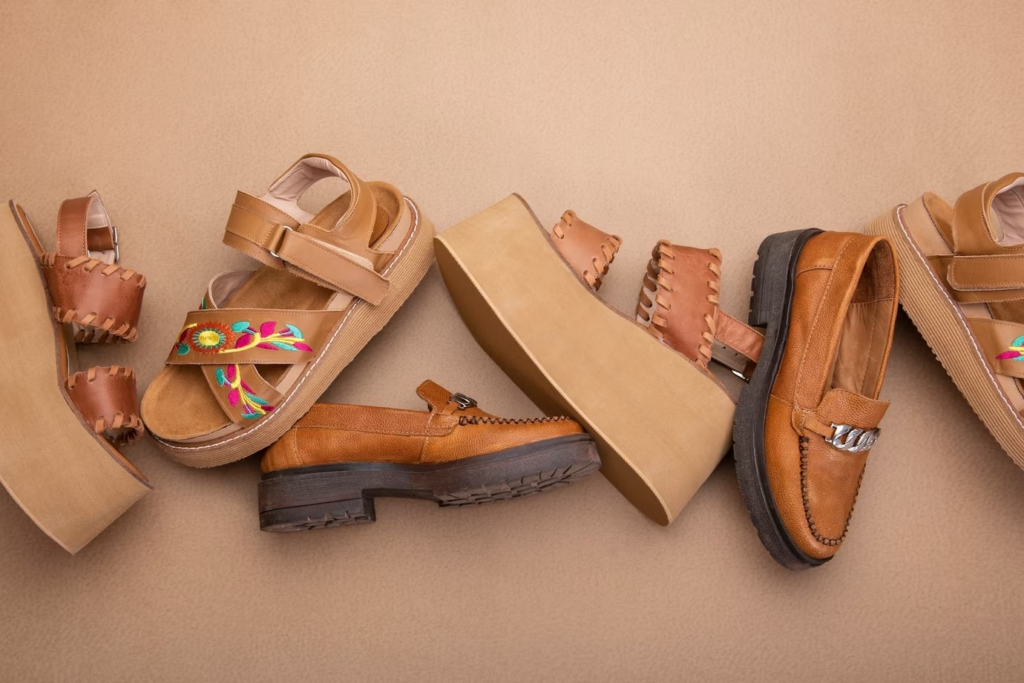Introduction:
In today’s world, where environmental concerns are at the forefront of global consciousness, sustainable and eco-friendly practices are becoming increasingly essential. One aspect of sustainability gaining traction is eco-friendly footwear. This overview provides a concise introduction to the concept of eco-friendly footwear, its importance, and what sets it apart in the realm of fashion and environmental responsibility.

Eco-Friendly Footwear: Products
Eco-friendly footwear has evolved beyond a niche market to offer a wide range of stylish and sustainable options for consumers. As demand for environmentally responsible products grows, innovative brands have stepped up to create eco-friendly footwear that not only reduces environmental impact but also meets high fashion standards. Here are some notable eco-friendly footwear products and categories:
- Vegan Shoes:
- Vegan footwear is entirely free from animal-derived materials, such as leather or suede. Instead, these shoes use synthetic or plant-based materials like cork, organic cotton, or recycled plastics.
- Brands like “Veja” and “Native Shoes” offer a variety of vegan shoe styles, from sneakers to sandals, without compromising on style or comfort.
- Recycled Materials:
- Footwear brands have embraced the use of recycled materials to create eco-friendly shoes. This can include upcycled textiles, plastic bottles, and even discarded fishing nets.
Eco-Friendly Footwear: Quality
When it comes to eco-friendly footwear, quality is a critical aspect that often goes hand in hand with sustainability. Consumers seeking eco-conscious options want shoes that not only minimize their environmental impact but also provide comfort, durability, and style. Here’s why quality matters in eco-friendly footwear:
- Longevity and Durability:
- High-quality eco-friendly footwear is designed to last. Durable materials and craftsmanship ensure that these shoes can withstand daily wear and tear, ultimately reducing the need for frequent replacements.
- Comfort and Performance: Quality eco-friendly shoes prioritize comfort and performance. This includes features like cushioning, arch support, and proper ventilation to enhance the wearer’s experience.
- Whether it’s eco-friendly sneakers, hiking boots, or casual sandals, comfort is essential to ensure the shoes are worn regularly and for extended periods.
Eco-Friendly Footwear: Benefits
Eco-friendly footwear offers a multitude of benefits that extend beyond personal comfort and style. These shoes are designed with the environment and ethical principles in mind, making them a responsible choice for conscious consumers. Here are the key benefits of eco-friendly footwear:
- Reduced Environmental Impact:
- Perhaps the most significant benefit of eco-friendly footwear is its reduced environmental footprint. These shoes are made from sustainable materials, such as organic cotton, recycled plastics, and natural rubber, which minimize the use of non-renewable resources.
- Eco-conscious manufacturing processes also reduce waste, energy consumption, and water usage, contributing to a healthier planet.
- Sustainable Material Choices:
- Eco-friendly footwear often incorporates renewable and biodegradable materials. This includes bamboo, cork, hemp, and other natural fibers that are not only eco-friendly but also durable and comfortable.
- By choosing these materials, consumers support sustainable farming and production practices.
Eco-Friendly Footwear: Customer Services
Customer services in the realm of eco-friendly footwear play a crucial role in enhancing the overall experience of conscious consumers. Sustainable footwear brands not only focus on producing environmentally responsible products but also strive to provide excellent customer support and services. Here are some key aspects of customer services in the eco-friendly footwear industry:
- Educational Resources:
- Eco-friendly footwear brands often offer educational resources to help consumers make informed choices. This includes information about sustainable materials, manufacturing processes, and the brand’s commitment to ethical and environmental practices.
- Educational content can be provided through blogs, videos, FAQs, and product descriptions.
- Product Information and Transparency:
- Transparent product information is essential. Brands should provide details about the materials used, the manufacturing process, and any certifications that validate the sustainability claims.
- Transparency builds trust and helps consumers understand the environmental and ethical impact of their purchases.
Eco-Friendly Footwear: Conclusion
In conclusion, eco-friendly footwear represents a significant and positive shift in the fashion industry towards sustainability and responsibility. These shoes, designed with the environment and ethical practices in mind, offer a multitude of benefits to consumers and the planet.


